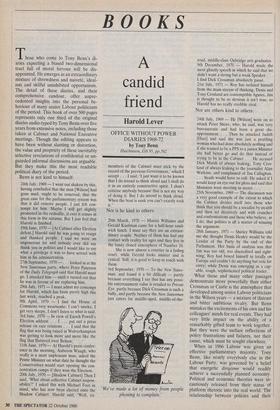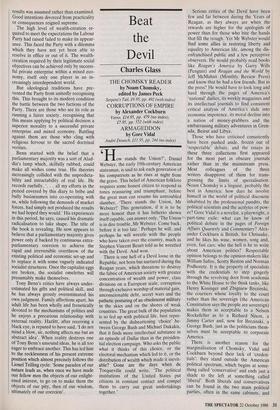BOOKS
A candid friend
Harold Lever
OFFICE WITHOUT POWER DIARIES 1968-72 by Tony Benn
Hutchinson, f16.95, pp.562
Those who come to Tony Benn's di- aries expecting a biased two-dimensional tract full of moral fervour will be dis- appointed. He emerges as an extraordinary mixture of shrewdness and naiveté, ideal- ism and skilful uninhibited opportunism. The detail of these diaries, and their comprehensive candour, offer unpre- cedented insights into the personal be- haviour of many senior Labour politicians of the period. This book of over 500 pages represents only one third of the original diaries audio-typed by Tony Benn over five years from extensive notes, including those taken at Cabinet and National Executive meetings. Though the editing appears to have been without slanting or distortion, the value and propriety of these inevitably selective revelations of confidential or un- guarded informal discussions are arguable. But they make this the most readable political diary of the period.
Benn is not kind to himself:
24th July, 1969 — I went out shaken by this, having concluded that the man [Wilson] had gone mad, ought to be removed, that the great case for the parliamentary system was that it did remove people. I just felt con- tempt for him. Maybe I will get slightly promoted in the reshuffle, if ever it comes in this form in the autumn. But I just feel that Harold is finished.
19th June, 1970 — [At Cabinet after Election defeat,] Harold said he was going to resign and thanked people. I said we were an ungenerous lot and nobody ever did say thank you in politics and I would like to say what a privilege it was to have served with him in his administration.
27th September, 1970 — . . . looked in at the New Statesman party, where Peter Paterson of the Daily Telegraph said that Harold must go. I attacked him — until it turned out that he was in favour of me replacing him.
29th July, 1971 — I must admit my contempt for Harold, which has been pretty high this last week, reached a peak.
9th April, 1970 — I find the House of Commons very wearisome: I can't smoke, I get very sleepy, I don't listen to what is said. 3rd June, 1970 — In view of Enoch Powell's Election address . . . I . . . put out a press release on race relations . . . I said that the flag that was being raised in Wolverhampton was getting to look more and more like the flag that fluttered over Belsen.
11th June, 1970 — At Harold's press confer- ence in the morning, Auberon Waugh, who really is a most unpleasant man, asked the Prime Minister on what date he thought the Conservatives would start opening the con- centration camps if they won the Election. 20th July, 1970 — [Shadow Cabinet] Then I said, 'What about collective Cabinet respon- sibility?' I asked this with Michael Foot in mind, who has now been elected onto the Shadow Cabinet. Harold said, 'Well, ex- members of the Cabinet must stick by the record of the previous Government,' which I accept . . . I said, 'I just want it to be known that I do intend to think aloud and I shall do it in an entirely constructive spirit. I shan't criticise anybody because that is not my way of doing it. But I do intend to think aloud. When the boat is sunk you can't exactly rock it.'
Nor is he kind to others:
20th March, 1970 — Marcia Williams and Gerald Kaufman came for a half-hour sand- wich lunch. I must say they are an extraor- dinary couple. Neither of them has had any contact with reality for ages and they live in the funny closed atmosphere of Number 10. . . . She is now almost a courtier in a fading court, while Gerald looks sinister and is cynical. Still, it is good to keep in touch with them.
3rd September, 1970 — To the New States- man, and found it a bit difficult — partly because everything I say that has any possi- ble entertainment value is retailed to Private Eye, partly because Dick Crossman is such a bully, and partly because the New Statesman just caters for middle-aged, middle-of-the- `We've made a lot of money from people phoning to complain.'
road, middle-class Oxbridge arts graduates. 9th December, 1970 — Harold made the most ghastly speech in which he said that we didn't want a strong but a weak Speaker . . . I find Dick Crossman absolutely passé.
21st July, 1971 — Roy has isolated himself from the main stream of thinking, Denis and Tony Crosland are contemptible figures, Jim is thought to be so devious it isn't true, so Harold has no really credible rival.
Nor are others kind to others:
24th July, 1969 — He [Wilson] went on to attack Peter Shore, who, he said, was very bureaucratic and had been a great dis- appointment . . Then he attacked Judith [Hart] and said she was just a prattling woman who had done absolutely nothing and if she wanted to be a PPS to a junior Minister she had better go and do that instead of trying to be in the Cabinet . . . He accused Dick Marsh of always leaking, Tony Cros- land of always leaking to the journalist Alan Watkins, and complained of Jim Callaghan. . . heads would have to roll. He asked if I would keep an eye out for plots and said that Ministers were meeting in secret . . .
25th November, 1969 — The discussion was a very good example of the extent to which the Cabinet divides itself into those who think that you should be a socialist by stealth and then act decisively and with crunches and confrontations and those who believe, as I do, that politics is all a matter of winning the argument.
28th January, 1971 — Shirley Williams told me she thought Denis Healey would be the Leader of the Party by the end of this Parliament. Her basis of analysis was that Jim was too old, too discredited and right- wing; Roy had boxed himself in totally on Europe and couldn't do anything but vote for entry; while Denis was emerging as a cap- able, tough, sophisticated political leader.
What these and many other passages demonstrate more powerfully than either Crossman or Castle is the atmosphere that developed among senior Labour politicians in the Wilson years — a mixture of distrust and bitter ambitious rivalry. But Benn mistakes the excitements of his own and his colleagues' minds for real events. They had very little impact on the ability of a remarkably gifted team to work together. But they were the surface reflections of policy frustrations and failures, not their cause, which must be sought elsewhere.
When in 1966 Labour was given an effective parliamentary majority, Tony Benn, like nearly everybody else in the Labour Party, was governed by a belief that energetic dirigisme would readily achieve a successfully planned economy. Political and economic theories were in- cautiously released from their status of platform rhetoric into the real world. The relationship between policies and their
results was assumed rather than examined. Good intentions divorced from practicality or consequences reigned supreme.
The high level of wealth-creation re- quired to meet the expectations the Labour Party had raised failed to make its appear- ance. This faced the Party with a dilemma which they have not yet been able to resolve in office or out of it. The wealth- creation required by their legitimate social objectives can be achieved only by success- ful private enterprise within a mixed eco- nomy, itself only one player in an in- creasingly interdependent world.
But ideological traditions have pre- vented the Party from unitedly recognising this. This brought to its modern condition the battle between the two factions of the Party. There are those who see its role as running a fairer society, recognising that this means applying by political decision a superior morality to a successful private enterprise and mixed economy. Battling against them are those who cling with religious fervour to the sacred doctrinal verities.
Benn started with the belief that a parliamentary majority was a sort of Alad- din's lamp which, skilfully rubbed, could make all wishes come true. His theories increasingly collided with the unpredicta- bility and intractability of real life. He records ruefully, `. . . all my efforts in the period covered by this diary to bribe and bully businessmen into co-operating with us, while following the demands of market forces, had simply not produced the results we had hoped they would.' His experiences in this period, he says, caused his dramatic radicalisation to take shape. The title of the book is revealing. He now appears to believe that a parliamentary majority gives power only if backed by continuous extra- parliamentary coercion to achieve the rapid and irreversible overthrow of the existing political and economic set-up and to replace it with some vaguely indicated socialist structures. Once the capitalist eggs are broken, the socialist omelettes will presumably make themselves.
Tony Benn's critics have always under- estimated his gifts and political skill, and he has always grossly overestimated his own judgment. Family affections apart, his adult life has been wholly and frenetically devoted to the mechanisms of politics and he enjoys a precarious relationship with external reality. Hazlitt, after receiving a black eye, is reputed to have said, 'I do not mind a blow, sir, nothing affects me but an abstract idea'. When reality destroys one of Tony Benn's unsound ideas, he is all too eager to embrace another. This has led him to the recklessness of his present extreme position which almost precisely follows the Lionel Trilling cycle: 'Some paradox of our nature leads us, when once we have made our fellow men the objects of our enlight- ened interest, to go on to make them the objects of our pity, then of our wisdom, ultimately of our coercion'.



































































 Previous page
Previous page